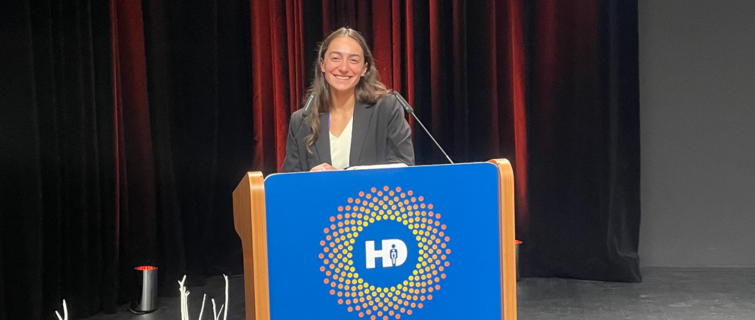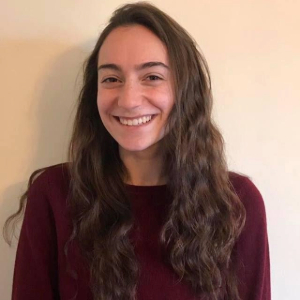
When Erin Caruso was 8 years old, she and her younger brother created a make-believe restaurant called Cookies and Cream.
“It was just a play restaurant that we used to do when we were very little kids, but we did everything,” says Caruso, a 2024 graduate of the Master’s in Project Management program at Georgetown University. “We made a menu. We had a website. We had the whole cost breakdown and everything.”
Picture a third grader and her 6-year-old associate doing cost breakdowns, and it’s perhaps not too big a stretch to conclude that, many years later, this self-described “very Type A, organized person” might excel in a field like project management. And, indeed, a month before she graduated, Caruso received a Tropaia award for her outstanding work in the program.
“She was always the first one to ask questions, which is a good thing,” says Lisa Mathews, Managing Director, Ethics and Compliance, for the “Big Four” accounting firm KPMG, who taught Caruso in the course Project Analysis and Communication & Collaboration for Project Managers. “As a professor, you always want somebody who is going to be conscientious and wants to make sure they’re getting it right. And she would ask questions on behalf of her team. She would come up with other solutions if something just didn’t seem right: she would problem-solve.”
These qualities—some innate, others learned through a program that teaches students to question their assumptions—are critical to the field of project management, Mathews says. Whether they use a “waterfall” construct, in which the steps are generally predetermined, or an “agile” system that anticipates change in the process itself, project managers must continually ask themselves: “Is this really what my stakeholders want?” “What have we forgotten?” What might change down the road?”
Taking Responsibility

A native of Rockville, Md., Caruso attended the University of Maryland as an undergrad, majoring in psychology with a neuroscience minor. During freshman year, she was a lifeguard at the university’s Eppley Recreation Center, and within a year she was named Head Lifeguard & Risk Auditor.
As an undergraduate, Caruso was interested in working with patients in the healthcare sector and thought she might find her niche in clinical trials. After graduating in 2019, she was hired as a Research Coordinator at Georgetown’s Huntington Disease Care, Education, and Research Center. She was promoted to Senior Clinical Research Coordinator in 2021 and four years later was named Research Manager.
Caruso took the project management program to increase her skills and improve efficiencies in the programs she manages. It was helpful that the students came from a wide variety of occupations—from business and industry to government agencies like NASA—because she could see what practices worked in other fields and apply that knowledge to her own.
“They call project management a science and an art, and there are efficiencies, regardless of the topic, that you can learn,” Caruso says. “[You can learn] about how to start a project. How to set communication expectations. How to build a budget. How to build out what a starting project would look like.”
Fighting a Devastating Illness
Huntington’s Disease is a degenerative brain disease, passed down in families, that causes mental, physical, and emotional deterioration. About 41,000 people in the United States have symptoms of the disease, and another 200,000 are at risk of inheriting it. With symptoms usually appearing between the ages of 30 and 50, the disease is progressive and incurable, but researchers around the world are trying to develop both treatments and a cure.
Georgetown’s Huntington Disease Care, Education, and Research Center takes a multidisciplinary approach to the disease, using teams of neuropsychologists, genetic counselors, therapists, social workers, and other professionals to treat patients and their families. It also conducts ongoing research trials, which Caruso and the research coordinators manage.
“We’re like the ‘kitchen sink’ coordinators,” Caruso says. “It means that everything in the kitchen sink, we do.”
That involves collecting and monitoring all the paperwork so research studies can be performed efficiently and ethically. It includes securing regulatory approval from Georgetown’s Institutional Review Board. It involves working with patients and their families, administering cognitive testing, keeping track of assessments, and ensuring that the proper technology is available for treatments and procedures.
Huntington’s is a devastating disease, but there is also hope, both in the treatments and in finding a cure. Parents in the program are especially motivated to help with the research because there is a 50 percent possibility that they will pass the condition on to their children.
Working with these patients takes a unique kind of professional who is sensitive and caring, optimistic but also realistic, extremely organized, and dedicated to the field. These are the qualities Caruso brings to Georgetown’s program.
“We have 10 studies in different spots right now,” Caruso says. “So, it’s a lot to manage, but I think what really attracted me was just the people component. I love working with people. I love helping those in need. It’s definitely the patient interactions that drive my passion and interest in this field.”
